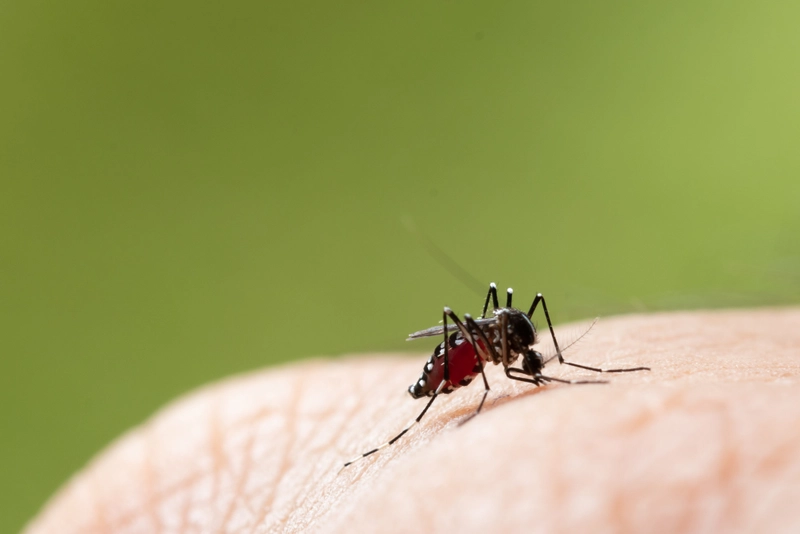- Published on: Aug 26, 2023
- 2 minute read
- By: Secondmedic Expert
Dengue Decoded: Cracking The Code On Symptoms, Prevention, And Treatment
Bzzz! Don't be alarmed—it's not a mosquito. But speaking of mosquitoes, did you know that they're not just pesky insects? They're the stealthy carriers of a viral villain known as dengue fever. Buckle up as we embark on an exciting journey of decoding the dengue mystery together. In this blog post, we'll be your guide as we unlock the secrets behind the symptoms, wield the shield of prevention, and unveil the arsenal of treatments against this buzzing menace!
The Dengue Drama Unveiled
Picture this: a high fever, pounding headaches, joint pain that feels like a symphony of discomfort, and a rash that's itching to steal the show. Welcome to the dengue drama! These are the key players in the cast of dengue symptoms, each taking center stage at different times. But why is it called 'breakbone fever'? Well, it's because the pain can be so intense that it feels like your bones might just crack under the pressure. Imagine a feverish overture followed by the suspense of joint pain and rash revelations—this is dengue's grand performance!
MythBusters: Dengue Edition
Ding-dong, myths be gone! Let's play a game of MythBusters with dengue. Myth: Dengue only strikes in hot temperatures. Reality check: Dengue mosquitoes can still wreak havoc during cooler seasons. And speaking of mosquitoes, they're not choosy when it comes to breeding sites. They'll happily lay eggs in even the tiniest bit of standing water. So, the real scoop on mosquito breeding sites is that they can be hiding in your own backyard! Bust those myths and you're one step closer to outsmarting dengue.
Your Superhero Cape: Prevention
Every hero needs a trusty cape, or in this case, a mosquito repellent! Welcome to the battle against dengue—the epic showdown between human and mosquito. Don your invisible cape and join the crusade against dengue by sabotaging mosquito breeding sites. Make sure no water is left standing for these tiny villains to lay their eggs. Shield your fortress from invaders by wearing protective clothing, using bed nets, and applying mosquito repellents. It's time to wield your prevention prowess and take the lead in this dengue-fighting adventure.
Dengue Detectives: Unmasking Treatment
It's time to put on your detective hat and unmask the truth about dengue treatment. When it comes to battling this viral adversary, knowledge is your most potent weapon. In the medical toolkit, there's a range of strategies, from fluid replacement to pain relief, designed to help you conquer the dengue dilemma. If you suspect dengue, seek medical attention promptly to receive the right guidance and treatment. Become a dengue detective and partner with healthcare professionals to ensure a successful mission against this viral nemesis.
Climate Chronicles: When Dengue Meets Weather
It's not just superheroes that are affected by climate change—dengue is in on the action too. When dengue meets weather, it's a story of shifting landscapes and altered dynamics. Climate factors can impact the prevalence and spread of dengue, influencing the regions where mosquitoes thrive and viruses are transmitted. As the climate changes, dengue may venture into new territories, creating a climactic showdown between these unlikely allies.
Eureka Moments: Research Breakthroughs
The race to conquer dengue is far from over, and the heroes behind the scenes are researchers working on groundbreaking solutions. One of the most anticipated breakthroughs is the development of a dengue vaccine. Science is on the case, investigating ways to harness the body's immune response to protect against dengue's onslaught. Imagine a world where a dengue vaccine becomes a reality—a world where we can proactively shield ourselves against this viral foe.
Empowering You as the Hero
In this story, you're not just a reader, you're the star of the adventure. Armed with knowledge about dengue symptoms, prevention methods, and treatment truths, you're equipped to take on the role of the hero. By staying informed and implementing preventive measures, you're contributing to the fight against dengue in your own community.
Conclusion: Unleash the Knowledge!
The dengue saga continues, but armed with knowledge, we're ready to face it head-on. By grasping the diverse symptoms, understanding effective prevention methods, and staying informed about the latest research, we're rewriting the script on this buzzing villain. Stay curious, stay informed, and let's crack the dengue code together!
Read FAQs
A. Dengue fever presents with a range of symptoms, including high fever, severe headaches, joint pain, and a rash. This combination of symptoms has earned it the nickname 'breakbone fever' due to the intense discomfort. Additionally, severe dengue symptoms might include bleeding, abdominal pain, and persistent vomiting. If you experience these symptoms, seeking medical attention is crucial.
A. Yes, dengue mosquitoes can breed in temperatures that might not be scorching hot. While they are more active in warm climates, they are adaptable and can still thrive in cooler seasons. Preventing mosquito breeding sites, such as eliminating standing water, becomes essential regardless of the temperature.
A. Research into a dengue vaccine is ongoing, and significant progress has been made. However, as of now, there is no universally approved dengue vaccine. Various candidates are being studied to develop effective vaccines that can provide immunity against the different dengue virus serotypes. Staying updated on research breakthroughs and practicing preventive measures remains crucial in the absence of a vaccine.










